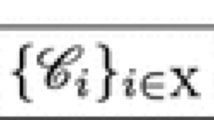Abstract
A suitable unified statistical formulation of quantum and classical mechanics in a *-algebraic setting leads us to conclude that information itself is noncommutative in quantum mechanics. Specifically we refer here to an observer's information regarding a physical system. This is seen as the main difference from classical mechanics, where an observer's information regarding a physical system obeys classical probability theory. Quantum mechanics is then viewed purely as a mathematical framework for the probabilistic description of noncommutative information, with the projection postulate being a noncommutative generalization of conditional probability. This view clarifies many problems surrounding the interpretation of quantum mechanics, particularly problems relating to the measuring process.
Similar content being viewed by others
REFERENCES
W. Heisenberg, The Physical Principles of the Quantum Theory (University of Chicago Press, Chicago, 1930).
J. Bub, “Von Neumann's projection postulate as a probability conditionalization rule in quantum mechanics,” J. Phil. Logic 6, 381–390 (1977).
C. A. Fuchs, “Quantum foundations in the light of quantum information,” in Proceedings of the NATO Advanced Research Workshop on Decoherence and Its Implications in Quantum Computation and Information Transfer, A. Gonis, ed. (Plenum, New York, 2001); quant-ph/0106166, quant-ph/0205039.
C. M. Caves, C. A. Fuchs, and R. Schack, “Quantum probabilities as Bayesian probabilities,” Phys. Rev. A 65, 022305 (2002).
O. Bratteli and D. W. Robinson, Operator Algebras and Quantum Statistical Mechanics 1, 2nd edn. (Springer, New York, 1987).
G. J. Murphy, C*-Algebras and Operator Theory (Academic, San Diego, 1990).
W. Rudin, Real and Complex Analysis, 3rd edn. (McGraw-Hill, New York, 1987).
B. O. Koopman, “Hamiltonian systems and transformations in Hilbert space,” Proc. Natl. Acad. Sci. U.S.A. 17, 315–318 (1931).
M. Born, Physics in My Generation (Pergamon, London, 1956).
D. Petz, “Conditional expectation in quantum probability,” in Quantum Probability and Applications III, L. Accardi and W. von Waldenfels, eds. (Springer, Berlin, 1988), pp. 251–260.
R. Duvenhage, “Recurrence in quantum mechanics,” Int. J. Theor. Phys. 41, 45–61 (2002).
C. A. Fuchs and A. Peres, “Quantum theory needs no ‘interpretation’,” Phys. Today 53(3), 70–71 (2000).
S. Straătilaă and L. Zsido´, Lectures on von Neumann algebras (Editura Academiei, Bucures¸ti and Abacus Press, Tunbridge Wells, 1979).
R. Haag, Local Quantum Physics: Fields, Particles, Algebras, 2nd edn. (Springer, Berlin, 1996).
J. Schwinger, Quantum Mechanics: Symbolism of Atomic Measurements (Springer, Berlin, 2001).
J. von Neumann, Mathematische Grundlagen der Quantenmechanik (Springer, Berlin, 1932); English transl. Mathematical Foundations of Quantum Mechanics by R. T. Beyer (Princeton University Press, Princeton, New Jersey, 1955).
T. Sudbery, “Continuous state reduction,” in Quantum Concepts in Space and Time, R. Penrose and C. J. Isham, eds. (Oxford University Press, Oxford, 1986), pp. 65–83.
A. S. Holevo, “Limit theorems for repeated measurements and continuous measurement processes,” in Quantum Probability and Applications IV, L. Accardi and W. von Waldenfels, eds. (Springer, Berlin, 1989), pp. 229–255.
B. Misra and E. C. G. Sudarshan, “The Zeno's paradox in quantum theory,” J. Math. Phys. 18, 756–763 (1977).
C. Cohen-Tannoudji, B. Diu, and F. Laloe¨, Quantum mechanics, Volume I (Hermann, Paris, and Wiley, New York, 1977).
A. Einstein, B. Podolsky, and N. Rosen, “Can quantum-mechanical description of physical reality be considered complete?,” Phys. Rev. 47, 777–780 (1935).
C. J. Isham, Lectures on Quantum Theory: Mathematical and Structural Foundations (Imperial College Press, London, 1995).
D. Finkelstein, “Space-time code,” Phys. Rev. 184, 1261–1271 (1969).
S. Doplicher, K. Fredenhagen, and J. E. Roberts, “The quantum structure of spacetime at the Planck scale and quantum fields,” Commun. Math. Phys. 172, 187–220 (1995).
J. Marsden, Application of Global Analysis in Mathematical Physics (Carleton Mathematical Lecture Notes, No. 3, 1973).
D. R. Finkelstein, Quantum Relativity: A Synthesis of the Ideas of Einstein and Heisenberg (Springer, Berlin, 1996).
R. F. Streater, “Classical and quantum probability,” J. Math. Phys. 41, 3556–3603 (2000).
Author information
Authors and Affiliations
Rights and permissions
About this article
Cite this article
Duvenhage, R. The Nature of Information in Quantum Mechanics. Foundations of Physics 32, 1399–1417 (2002). https://doi.org/10.1023/A:1020359806696
Issue Date:
DOI: https://doi.org/10.1023/A:1020359806696




